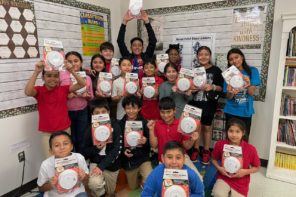This time of year reminds me of kayaking toward a waterfall. As the New Year kicks off, things start to move faster, knowing how much is going to be added to our already-full plate. This year seems especially treacherous as we maneuver the route, trying to avoid the obstacles thrown in our way.
As we look ahead at the daunting task of navigating these next few months, it is helpful to keep in mind that challenges can also offer opportunities to build resilience. If we are proactive, we can work together to conquer those obstacles and emerge both stronger as individuals and as a family this year.
1. Let kids struggle
Self-esteem is not a gift that we can give our kids, it is a neurochemical response we rob them of when we don’t let them struggle.
I give presentations to parents all the time, and this is my favorite line. When we work toward a goal, experience failure and then persist until we succeed, our brains get a nice dose of dopamine and serotonin. Think about them as text messages to our brain that say “Wow, that felt good—we should keep working hard.” When we don’t let our kids struggle, we rob them of that response.
How many toddlers have we seen telling their parents, “I want to do it myself!” Parents, with the best of intentions, try to shelter their children from struggle. We want to help them; it is in our nature. Unfortunately, in the long run, it can set them up for problems.
Our highest-level thinking skills are developed when we push ourselves to think outside of the box. Often, when kids are over-scheduled with adult-led activities and adult-designed toys, they miss out on these opportunities for out-of-the-box, creative thinking. One good thing that has come out of the pandemic is that it has allowed us to slow down and have more unstructured time.
This year, try to set out some challenges for your children that encourage creative thinking and persistence. Then, work on resisting the urge to intervene when they are having trouble.
2. Use the “Four Ss” as a framework to teach resilience
Every challenge offers parents an opportunity to actively teach kids resilience, because no matter what the challenge, our response is guided by our understanding of four Ss: self, situation, supports and strategies. Each time we use these to help our kids prepare for, handle and reflect on challenges, it helps build more resilient brain pathways.
Throughout the winter, use those Four Ss when you feel the urge to step in and help when your child is struggling. Instead of stepping in, give them some guiding questions:
- Is your strategy working?
- Do you have someone you can ask for help?
- What strength do you have that you can draw on?
- Can you break this down into smaller parts?
3. Scaffold for independence
You know how when a large building is being constructed, the builders set up scaffolds, which are gradually removed as the building becomes more structurally sound? This is similar to the job of parenting. Our goal should always be focusing on what our children need in order to become independent, and providing just enough support, gradually removing those supports as our children become more independent.
This year, think about a few skills that you would like your children to do more independently and then think about the supports that you need to provide in order to get them there. For example, many kids are going off to college without the ability to make a phone call (yes, it is true). They communicate through social media and perhaps the occasional text when pressed by their parents, but many of them have not had reason to make a phone call, and they are often scared by the prospect. Try setting up a few calls that your child will need to make and teach them how to do it. Maybe you can have them call a restaurant to place a take-out order. At first, you will likely have to script the conversation for them, but gradually, they will become more comfortable and may even be able to improvise.
4. Give them responsibilities
My favorite household rule has always been, “with privileges come responsibilities and with responsibilities come privileges.” Our kids are growing up in an age in which parents love to micromanage. However, as kids get older and head into adolescence, they need to understand how to make responsible choices. The best way for them to learn that is to begin to take on responsibility early on.
This year, think about age-appropriate chores and responsibilities that your kids can do and teach them how to do them. For example, perhaps your kids are responsible for doing the dishes, taking out the garbage or planning and cooking a meal.
5. Play together
So often, video games become a source of tension between parents and kids. I know that when my kids were younger, they certainly were. Looking back, so much of that was because I feared what I didn’t understand.
Recently, I read SuperBetter, by Jane McGonigal, and it changed my perspective. As a game designer, McGonigal is on a mission to help people understand the benefits of living “gamefully.” As an educator, what she was saying made a lot of sense. Since reading the book, I reached out to my teens to learn about the games that they are playing and join in on the fun. From Among Us to HayDay to Game Pigeon, our gameplay has been forging stronger bonds—and I am really enjoying it!
New Year, same you
Although all five of these things will have benefits, perhaps the most important thing that we can do for our kids this year is to take care of ourselves. It comes back to the safety talk on the airplane (remember traveling?): you need to put on your own oxygen mask first. Life is difficult; it is full of challenges, and right now we are facing the most challenging time that we have faced in our lifetime.
In order to take care of ourselves and our family, we need to let some things go and take time to care for ourselves. The good news is that it looks like there is a light at the end of the tunnel. This spring will likely begin the journey back to a bit of normalcy, and, hopefully, we can start that journey in a stronger, more resilient place.
Donna M Volpitta, Ed.D. is the founder and education director of Pathways to Empower, a website offering parents, educators and students tools to feel confident in fostering mental health and teaching mental health literacy.





